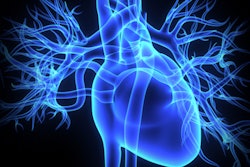
The inappropriate use of SPECT myocardial perfusion imaging (MPI) in women can increase their risk of cancer from radiation compared to men, according to a study published online April 21 in the Journal of Nuclear Medicine.
Women not only had a potentially greater risk of cancer than men over their lifetime from inappropriate MPI tests, but the scans were also less likely to predict a major adverse cardiac event or the need for revascularization within six months, researchers found.
Conversely, when men and women underwent appropriate SPECT MPI with similar radiation dose, the risk of cancer during a woman's lifetime was considerably lower -- down to a level almost identical to that of men.
"We demonstrated that inappropriate MPI use is not only associated with unnecessary cancer risk, but rather an excess cancer risk as compared to studies performed for an appropriate/uncertain indication," wrote the authors from Rush University Medical Center and John H. Stroger, Jr. Hospital of Cook County, both in Chicago (JNM, April 21, 2016).
Radiation risks
The rapid growth in MPI utilization over the past few decades has prompted efforts to use appropriateness criteria to cut down on unnecessary utilization. Indeed, a recent study from the University of Florida found that women are more likely than men to have an inappropriate SPECT MPI scan, partly due to atypical symptoms, which may overestimate the true health risk to the female patient.
But in addition to saving healthcare dollars, reducing unnecessary MPI scans can also lower radiation exposure, according to Dr. Rami Doukky, the hospital's chief of cardiology.
 Dr. Rami Doukky from Rush University.
Dr. Rami Doukky from Rush University."There has been an increasing apprehension regarding the risk of radiation related to all imaging procedures, and with myocardial perfusion imaging in particular because it is a very commonly performed study," he told AuntMinnie.com.
While there remains some debate on the degree to which the risk of cancer is related to low-dose ionizing radiation, the common perception is that "the risk of radiation is linearly related to the amount of radiation received," Doukky added.
The current paper takes one step further a 2013 prospective study by Doukky and colleagues that found that inappropriate SPECT MPI "severely impairs its value for risk assessment of patients with known or suspected ischemic heart disease, negatively impacting cost-effectiveness and radiation exposure."
But when used appropriately, SPECT MPI achieves "robust prognostic value, even in contemporary community-based settings," the authors wrote (Circulation, October 2013, Vol. 128:15, pp. 1634-1643).
For the current study, the researchers used the same 1,511 consecutive outpatients from the 2013 study, who were referred for SPECT MPI between August 2007 and May 2010 at 11 community-based cardiology and primary care practices in the Chicago area.
Patients underwent same-day rest and stress imaging using a technetium-99m (Tc-99m) sestamibi protocol and standard dual-detector cardiac SPECT camera. They were then prospectively followed for a mean of 27 months (± 10 months) to evaluate major adverse cardiac events, meaning nonfatal myocardial infarction or death, as well as coronary revascularization within six months of MPI.
The researchers used a combination of Monte Carlo analyses and 10,000 random independent samplings for the probability of major adverse cardiac events, six-month revascularization, and the lifetime attributable risk of cancer from a single SPECT MPI scan.
MPI cases
Doukky and colleagues found that MPI referrals were appropriate in 779 cases (52%), compared with 688 inappropriate scans (45%) and 44 studies (3%) deemed uncertain. They then divided the patients into an appropriate/uncertain group of 823 subjects (54%) and an inappropriate scan group of 688 individuals (46%).
When asked about the large number of inappropriate MPI scans, Doukky, who also serves as a professor of preventive medicine and radiology at Rush Medical College, said the numbers are indicative of when the scans were conducted from 2007 to 2010, when inappropriate tests were more prevalent than today.
"I think it also reflects real-life cases," he said. "These are patients who are tested in private-practice offices and not in academic centers or tertiary care centers, where you would expect to find patients who are sicker and more likely to fall in the category of appropriate testing."
Patients in the inappropriate group were predominantly women and younger patients with lower prevalence of coronary artery disease and related risk factors, and who were less likely to have abnormal MPI results.
"It is known that women are more susceptible to ionizing radiation due to the exposure of the breasts, particularly with cardiac imaging," Doukky said. "Secondly, younger patients have more years to live with the risk of radiation and, therefore, are more susceptible to cancer risk related to radiation."
Risk and outcomes
During follow-up, there were 22 major adverse cardiac events (1.5%) among the subjects and 29 revascularizations (2%) within six months.
The appropriate/uncertain group had 20 major adverse cardiac events, compared with two events the inappropriate test group. The difference in the rate of coronary revascularization was not statistically significant between the two groups. There were 19 revascularizations in the appropriate/uncertain group, compared with 10 procedures in the inappropriate test group.
The patients with inappropriate MPI tests had a significantly greater lifetime attributable risk of cancer (8.31 cases per 10,000), compared with those with appropriate/uncertain scans (6.0 per 10,000) (p < 0.001). In addition, inappropriate MPI tests were less likely to predict a major adverse cardiac event (1.8 cases per 10,000), compared with appropriate/uncertain tests (4.6 cases per 10,000) (p < 0.001).
Some of the results were predictable, Doukky said, such as the finding that appropriate SPECT MPI tests were associated with a lower risk of cancer than inappropriate scans. It also was predictable that for the same radiation dose, women had a greater risk of cancer (7.93 cases per 10,000) than men (6.43 cases per 10,000) among the entire cohort, he added.
The disparity in the estimated cancer risk was even greater in the inappropriate test group: Women had a cancer risk of 9.09 cases per 10,000, compared with 7.54 cases per 10,000 for their male counterparts. What was not predictable is that in the appropriate/uncertain test group, the cancer risk was almost identical, at 6.10 cases per 10,000 for women and 5.93 cases per 10,000 for men.
"When the test was appropriately performed in women, the difference in risk of cancer related to gender disappeared," Doukky said. "The reason for that is that when you do the test appropriately, you are eliminating younger women and low-risk women from testing."
Follow the criteria
Based on the results, Doukky said it is most important that appropriate use criteria be followed for SPECT MPI scans.
"An added benefit of using appropriate use criteria is reducing the radiation burden on the patient population in general," he said. "Again, if you test women appropriately with myocardial perfusion imaging, you theoretically are not giving them any excess risk of cancer than their male counterparts."
The challenge is to implement the criteria "in a seamless way in day-to-day clinical decision-making," he said.
"No physicians can remember all of the criteria for all modalities," Doukky said. "We need decision-support tools to make these decisions easy, natural, and as seamless as possible, and so it does not add time and effort to find out when [imaging tests] are appropriate and when they are not. That is our challenge for the next decade."




















